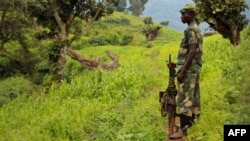GOMA, DRC —
The Democratic Republic of Congo’s government is denying it has pulled out of the Kampala peace talks with the M23 rebels, and says it is the rebels who have left the talks. Congo’s government spokesman said talks are not going well because the rebels have been making impossible demands.
DRC government spokesman Lambert Mende was reacting to comments made Sunday by Bertrand Bisimwa, the M23's leader. Bisimwa said the government was not committed to the Kampala talks and the officials in its delegation had gone back to Kinshasa.
Mende insists it is not the government that abandoned the talks. "It is the M23 who have pulled out of the negotiations," he said. "The government delegation is still in Kampala. The M23 announced they were pulling out four days ago."
A VOA reporter in Kampala, Austere Malivika, said some of the government team is still in Kampala and the head of the delegation, the foreign affairs minister Raymond Tshibanda, met the Ugandan facilitator of the talks in Kampala two days ago during a stopover between Addis Ababa and Kinshasa.
The M23 has not denied that its team in Kampala was down to just two people at the weekend.
The two delegations have met just once since the start of this month, but have been communicating via a Ugandan facilitator.
Mende said the government team went to Kampala to negotiate, which he said can be done through a facilitator as this is a common formula in negotiations.
The two sides appear far apart on some key issues.
Bisimwa said Sunday if the government is not prepared to give the M23’s fighters amnesty that means it does not want peace, and if the government will not integrate M23 fighters in the army that also is a big problem.
Mende said the government is ready to give amnesty and integrate the rank and file of the M23 in the army, but not the commanders.
He said Kinshasa cannot give amnesty to the entire M23 because, he said, it includes war criminals and others guilty of serious human-rights violations, and the government is committed under international conventions to bring these people to justice.
For the same reason, he added, the government cannot integrate the M23’s commanders into the army.
DRC government spokesman Lambert Mende was reacting to comments made Sunday by Bertrand Bisimwa, the M23's leader. Bisimwa said the government was not committed to the Kampala talks and the officials in its delegation had gone back to Kinshasa.
Mende insists it is not the government that abandoned the talks. "It is the M23 who have pulled out of the negotiations," he said. "The government delegation is still in Kampala. The M23 announced they were pulling out four days ago."
A VOA reporter in Kampala, Austere Malivika, said some of the government team is still in Kampala and the head of the delegation, the foreign affairs minister Raymond Tshibanda, met the Ugandan facilitator of the talks in Kampala two days ago during a stopover between Addis Ababa and Kinshasa.
The M23 has not denied that its team in Kampala was down to just two people at the weekend.
The two delegations have met just once since the start of this month, but have been communicating via a Ugandan facilitator.
Mende said the government team went to Kampala to negotiate, which he said can be done through a facilitator as this is a common formula in negotiations.
The two sides appear far apart on some key issues.
Bisimwa said Sunday if the government is not prepared to give the M23’s fighters amnesty that means it does not want peace, and if the government will not integrate M23 fighters in the army that also is a big problem.
Mende said the government is ready to give amnesty and integrate the rank and file of the M23 in the army, but not the commanders.
He said Kinshasa cannot give amnesty to the entire M23 because, he said, it includes war criminals and others guilty of serious human-rights violations, and the government is committed under international conventions to bring these people to justice.
For the same reason, he added, the government cannot integrate the M23’s commanders into the army.




